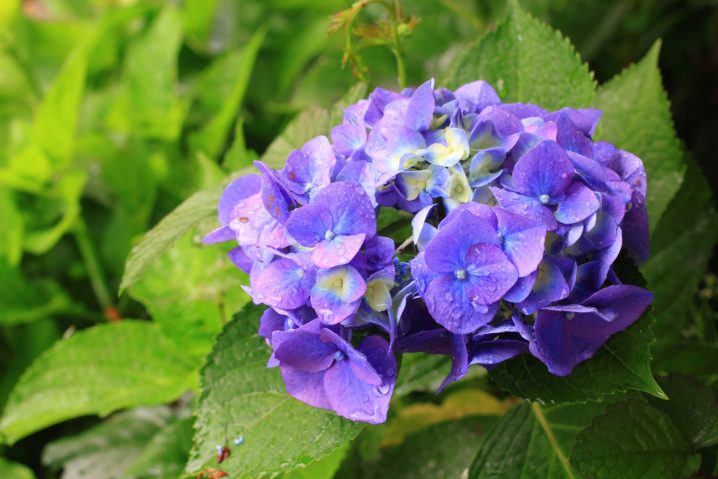It’s rainy season again.
To be honest, I have mixed feelings about it. On the one hand, when it rains it is cooler. Also, I have a garden, and most of my plants love a good rain. It saves me the effort of watering them too. On top of that, there’s something about seeing the heavens open and it bucket down for a short while. You can really feel the power of nature. It’s quite refreshing in a way.
However, on the other hand, when it stops you get hit by the humidity. It’s not quite as hot as summer but the mugginess more than makes up for it. Some days the air is so thick that you can cut it with a knife. Walking around outside, you feel like you are swimming in the moisture. I have been feeling it all the more this year because I am wearing a mask every day. It is the first time for me to wear one this time of year, and it makes a huge difference. In normal years, it is very sticky outside, but recently the combination of it being hotter than usual, and the mask has made it downright oppressive. In addition, I have almost constant beads of sweat forming a semi-permanent ring around my mouth. My breathing seems to have become a little more labored as well, so I really do worry about what this year’s summer will bring. With all of this, I have actually been longing for a good bucket recently. They have become a welcome relief from the heavy atmosphere.
I have heard that wearing masks this time of year can increase the chances of suffering from heatstroke. So, please take care out there, and don’t overdo it.
Below are some words and phrases that may come in handy for this time of year:
my plants love a good rain
We talk often about people or animals loving things, but this can also apply to plants and things as well. One way to add a little life to your writing is to ascribe human qualities to nonhuman things (e.g. My car loves a good wash.)
the heavens open (up)
This phrase is of course used a lot in biblical writing for various happenings, but it is also used to mean “begin to rain”. It is usually followed by an expression that expresses the falling of rain (e.g. The heavens opened up and it poured done on us.)
bucket (down)
We all know what a “bucket” is. But did you know that this can also be a verb? It means to rain heavily. It think it’s pretty easy to picture. You can either say “bucket” or “bucket down” depending on your preference (e.g. It has been bucketing down all morning.)
mugginess
I know many of you are familiar with the adjective “muggy” which means to be very humid. This, like with many adjectives also has a noun form, which in this case is made by adding the suffix “ness”. “Mugginess” means the same as “humidity”, but is more informal.
The air is so thick that you can cut it with a knife.
This is another expression that I think is pretty easy to picture. When the air is filled with moisture, you can say that it is “thick”. It is the same as how you might describe a soup. Imagine the soup being so thick that you could actually cut it with a knife. That can also be used to describe the atmosphere. We also use the expression “you could cut the atmosphere with a knife” to describe a situation in which everyone in a particular place is feeling very angry or nervous, and you feel that something unpleasant could soon happen (e.g. I don’t know what he said to her, but you could cut the atmosphere with a knife.)
sticky
The adjective “sticky” means to be covered with a substance that sticks (e.g. My fingers were all sticky after eating the ice cream cone.) You can also use it to describe hot and humid weather or yourself when you get hot and wet from sweating or the moisture in the air.
oppressive
“Oppressive” usually means cruel and unfair (e.g. The country was ruled by an oppressive regime.) But, it can also be used to talk about an uncomfortable atmosphere (e.g. There was an oppressive silence in the room.) and to describe weather which is too hot and without wind (e.g. It’s very difficult to get to sleep in this oppressive heat.)
labored
The adjective “labored” means requiring a lot of effort. It is often used to describe difficulty in breathing, but can also mean something that is done without ease such as “a labored joke”.
longing for
To “long for” something means to strongly desire that thing (e.g. He longed for a time when we no longer lived in fear of the virus.)
I hope this comes in handy.
See you next month. Take care!

Hello! My name is Simon.
I am from New Zealand, and have been living and teaching English in Japan since 1999.
My hobbies include movies, playing the guitar, gardening and hiking.
※このブログでは英語学習に役立つ情報アドバイスを提供していますが、本ブログで提供された情報及びアドバイスによって起きた問題に関しては一切、当方やライターに責任や義務は発生しません。
※ここでの情報や助言を参考に英文を書いたり下した判断は、すべて読者の責任において行ってください。ここに掲載されている記事内の主張等は、個人の見解であり当社の意見を代弁・代表するものではありません。








 (10 イイネ!が押されています)
(10 イイネ!が押されています)




























コメントする